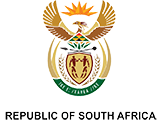Dear Fellow South African,
Last week, government concluded the auction of high demand spectrum for mobile telecommunications. This is a significant milestone in our reform agenda, which will, as we have said before, drive growth and transformation in our economy.
The licensing of spectrum is one of the major reforms that we are implementing to modernise and transform key network industries such as energy, telecommunications, transport and water provision. Already much progress has been made in creating new opportunities for investment in electricity generation, freight rail and ports, and in improving the management and quality of the country’s water resources.
The licensing of this new spectrum will be accompanied by agreed social obligations to connect public schools, health facilities and police stations over the next three years. Like the mineral wealth that lies beneath our soil, radio spectrum is a valuable national resource that needs to be used for the benefit of all South Africans.
Through its data services market inquiry in December 2019, the Competition Commission found that the cost of data in South Africa was considerably higher than in many other countries. The spectrum release is expected to reduce the cost of mobile data, expand network reach to rural and outlying areas, and improve network quality. Every South African who uses a mobile device will feel the benefits of this reform, especially the poor and those who currently don’t access the internet due to high costs or a lack of coverage.
Expanding digital access is critical for economic growth. Cheaper data means that young people will have greater access to digital platforms to seek job opportunities online. Students will be able to access information and educational materials. Entrepreneurs will be able to start businesses and reach new markets.
Equally, the availability of this spectrum will contribute to economic transformation. It will allow many more people, especially those from remote areas and poor communities, to access digital resources and will improve their ability to participate in economic activity.
The use of this spectrum will also enable the rollout of 5G networks. These 5G networks will accelerate the process towards universal connectivity – where all South Africans are connected – and the deployment of the digital technologies and services that are driving the fourth industrial revolution. This is a crucial step to bring South Africa back to the cutting edge of digital technology and ensure that our economy remains competitive.
Over the last year, the process of switching from analogue to digital broadcasting has gathered pace and will soon be completed. Digital migration will also free up valuable radio frequency spectrum currently used by broadcasters to be used in the provision of mobile broadband services and other applications. The switch to digital improves the TV watching experience, with many more channels and better quality picture and sound.
Digital migration will enable a massive leap forward in South Africa’s technological development. For poor households that are currently using an old analogue television, government is providing subsidised set-top boxes to help them make this switch.
The auction of spectrum is an important achievement. It was delayed for many years due to the policy drift, state incapacity and vested interests that were a feature of the era of state capture. The fact that we have now completed this process reflects the determination of this administration to undertake – and accelerate – the far-reaching reforms that our economy needs to grow and create jobs.
The auction of spectrum is one of the priority reforms included in Operation Vulindlela, which is working with government departments to accelerate the implementation of important reforms to support economic growth. By putting in place dedicated capacity to deliver on reforms, and focusing on the most important priorities, Operation Vulindlela has helped us to make real progress in a short space of time.
We are determined that South Africa must not be left behind by the digital economy, just as we are determined that no community and no person should be left behind in experiencing the vast benefits of being digitally connected to the world.
With best regards,
With best regards,

- Tags:
- Telecommunications /
- Spectrum /
- Licensing of spectrum /
- Spectrum auction /
- Internet /
- Digital migration /
- Data prices /
- 5G


